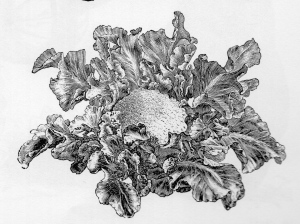Robin McDouall on clubland vegetables along with four bonus recipes
His Clubland Cookery, notwithstanding McDouall’s mischievous intentions, is more than the interesting artifact of a lingering elite. Food, he insists in Clubland, always was the foundation of the great London clubs along with a few in Dublin, Edinburgh and elsewhere. The food the clubs served their members was British during the quotidium, French for fetes. His recipes therefore do skew British and, in his hands, British recipes bear a striking minimalist slant.
Vegetables are very nearly an afterthought to Clubland Cookery, not because McDouall dislikes them but because he likes them simply prepared. McDouall characteristically compounds the problem his reader will encounter in seeking some guidance. This is him, from Clubland, on vegetables:
“All clubs and most private houses have their cookery books from which they select their recipes for cooking vegetables. I therefore include… only a few vegetable dishes but most will, I am sure, come out of readers’ heads or out of their favourite cookery books.” (Clubland 120)
The same, of course, may be said about a recipe for anything else, and McDouall is a master of misdirection as well as a culinary minimalist. The ‘few vegetable dishes,’ however, are not bad; some of them extremely good and his advice, mostly, sound.
On asparagus he is infallible:
“One of the things which is better in England than anywhere else is asparagus. Clubs would not mess them about and put cheese with them. Plain boiled with melted butter or hollandaise, cold with plain vinaigrette (no chopped onion). Water. Even London water, tastes better with asparagus.” (Clubland 120)
Cabbage, justifiably despised by those who were brought up by bad cooks whether institutional or domestic, should delight anyone who eats the brassica prepared according to McDouall’s simple stricture:
“It is rare to get good cabbage other than the cabbage one has cooked oneself. I do not know a club where I should choose cabbage. Yet all one has to do is discard the outer leaves of a white cabbage, cut out the hard part of the stalk, shred it and put it in a saucepan with just enough water to prevent it sticking and add salt and pepper. Cook it on a low flame for about 7 minutes. Drain. Toss in butter. Correct the seasoning and serve.” (Clubland 122)
Do nothing else and so encourage your cabbage to sing. Presumably by ‘green’ McDouall refers to Savoy cabbage.
Then there is cucumber, which as a vegetable never much gets its due. Along with McDouall, we “have a passion for cooked cucumber, which one rarely sees.” (Clubland 123) He, however, cuts his cucumbers into discs and poaches them in water for twenty minutes: Too long, and otherwise for the most part do not do as he does.
McDouall does peel his cucumber for cooking and you should follow that suit, then cut it into batons and braise it a bath of white wine or vermouth laced with (unsalted) butter along with some celery seed, a little salt and a pinch or so of white pepper. Simmer the celery until barely fork tender, usually in about 10 minutes.

You also can cook lettuce to excellent effect, something Americans at least never seem to do. McDouall offers two alternatives and, fitting enough given his predilection, the simpler is the better of them. Blanch your lettuce for about five minutes (even though he specifies ten) in naked water.
“Strain off all the water, pressing the lettuces [sic; British usage] with the back of a wooden spoon. Then add a generous lump of butter, salt, pepper and lemon-juice. Serve just like that.” (Clubland 125)
As usual the butter should not be salted.
McDouall has a (very) few other recipes for vegetables but, because readers will have their own books for cooking vegetables, we need not delve deeper into the clubland canon of recipes for them.
